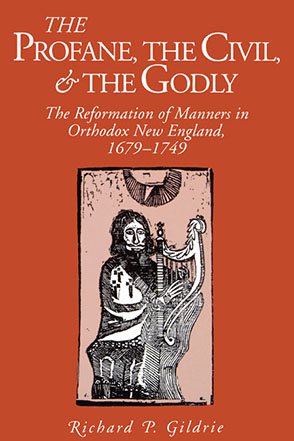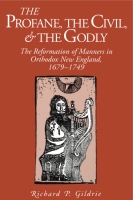
The Profane, the Civil, and the Godly
The Reformation of Manners in Orthodox New England, 1679–1749
Richard P. Gildrie
The Profane, the Civil, and the Godly
The Reformation of Manners in Orthodox New England, 1679–1749
Richard P. Gildrie
“Richard Gildrie has given us an original, provocative, and well-written account of the Puritan ‘Reformation of Manners’ and its intersection with the newly invigorated English folkways of late seventeenth-century New England. Students will like it for its engaging vignettes of New England life as well as for the clarity of its argument. The title, drawn from the reformers’ typology, conveys the dynamic quality of the New England Gildrie portrays. This is not a rigid ‘Puritan’ world but a world in tension between different, but equally colorful and distinct views of the world.”
- Media
- Description
- Reviews
- Bio
- Subjects
1991 Kenneth Scott Latourette Prize in Religion and Modern History (Conference on Faith and History)
In this prize-winning study of the sacred and profane in Puritan New England, Richard P. Gildrie seeks to understand not only the fears, aspirations, and moral theories of Puritan reformers but also the customs and attitudes they sought to transform. Topics include tavern mores, family order, witchcraft, criminality, and popular religion. Gildrie demonstrates that Puritanism succeeded in shaping regional society and culture for generations not because New Englanders knew no alternatives but because it offered a compelling vision of human dignity capable of incorporating and adapting crucial elements of popular mores and aspirations.
“Richard Gildrie has given us an original, provocative, and well-written account of the Puritan ‘Reformation of Manners’ and its intersection with the newly invigorated English folkways of late seventeenth-century New England. Students will like it for its engaging vignettes of New England life as well as for the clarity of its argument. The title, drawn from the reformers’ typology, conveys the dynamic quality of the New England Gildrie portrays. This is not a rigid ‘Puritan’ world but a world in tension between different, but equally colorful and distinct views of the world.”
“Richard Gildrie explains the nature of the dialogue in colonial New England between the clergy and the adherents of popular, secular, individualistic traditions. He demonstrates that each side shared in some of the assumptions of the other, and in exploring this common ground of popular beliefs, he follows in the footsteps of David Hall. Gildrie breaks new ground, however, in reconstructing the world of the ‘profane,’ going beyond Hall’s emphasis on the middle ground of popular religion to focus on the culture of those who stood off from religious orthodoxy. Gildrie’s careful research and skillful selection of quotations make the members of this group come alive.”
Richard P. Gildrie is Professor of History at Austin Peay State University and author of Salem, Massachusetts, 1626–1683: A Covenant Community (1975).
Mailing List
Subscribe to our mailing list and be notified about new titles, journals and catalogs.



